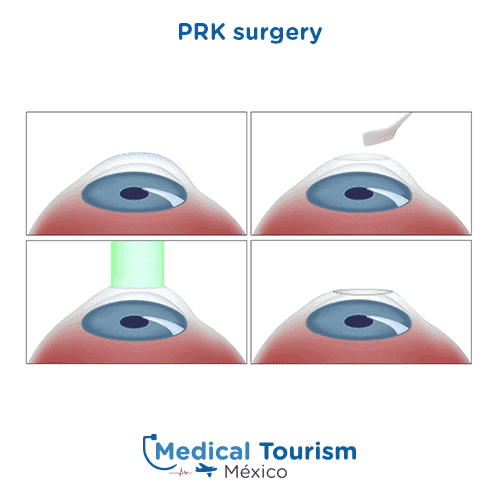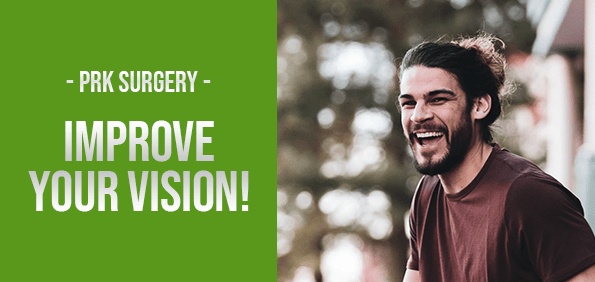The most reliable doctors in Mexico
PRK surgery information and locations in Mexico
PRK was the first type of laser surgery and is the predecessor to the LASIK procedure. It works
for myopia, hyperopia, and astigmatism, and though it takes more recovery time, it has the
advantage to treat patients with thinner corneas. This is a same day procedure.
Surgeons give the patient medication to numb the eye, and then the surgeon gently removes the
outer layer of the cornea, epithelium as it’s called. Afterward, an ultraviolet beam of light
is used on the surface of the cornea to re-shape it. The epithelium will grow back after
surgery.
Contact any of the top specialists for PRK eye surgery and get excellent medical care!
Benefits
High success rates
It is a simple surgery
Suitable for patients with a thin cornea
No more glasses
It is a simple surgery
Suitable for patients with a thin cornea
No more glasses
PRK
Procedure:
15 min.
Hospital stay: 10 min.
Cleared to fly: 1 day
Hospital stay: 10 min.
Cleared to fly: 1 day
After surgery
Out of town patients’ follow-ups are scheduled with the ophthalmologist after 1 - 3 days from PRK surgery. Patients
are clear for flying after 1 day from PRK surgery.
Note: Follow-ups can be arranged as face-to-face or virtually. If needed, you can go to your primary care physician to remove sutures or get medication adjustments.
As an Amazon Associate, we earn from qualifying purchases.
Take a look at one of our medical tourism essentials for eye surgery.
Take a look at one of our medical tourism essentials for eye surgery.
Additional images
View additional images for this procedure.

View more


Locations
Select the city of your choice to seethe doctors profile.
Ciudad Juarez, Chih.
Dr. Luis R. Juárez
View more

PRK surgery frequent questions
Get answers to our most frequently asked questions and what to expect after the surgery.
Am I a candidate for PRK surgery?
Candidates for surgery either have myopia, hyperopia, and astigmatism or don’t wish to continue to use contact lenses or glasses. This surgery can be an alternative for patients who don’t qualify for a LASIK surgery. We recommend you to refer to one of our professional doctors for an evaluation to determine if you are a candidate for surgery.
How can I prepare for PRK surgery?
Your specialist will evaluate your eye to determine the shape of your cornea, pupil size and condition. Doctors will usually ask you to stop wearing contact lenses about 3 weeks before surgery and corrective glasses for 3 days.
Will I feel pain during surgery?
Your doctor will place drops on your eyes to numb them, during surgery will only feel some pressure on the eye.
What happens after surgery?
Immediately after the procedure, you could experience some itch with a burning sensation, and your eyes will be watery. You will need to wear sunglasses in the outdoors as long as your specialists think is necessary. At first, it will seem your vision is getting worse, but it starts to improve around 3 or 5 days.
What is the difference between PRK and LASIK?
Lasik is a newer procedure, and it only requires a small flap to be made on top of the cornea, a laser then works under the cornea. In a LASIK procedure, the outer part of the cornea is removed and an ultraviolet light works directly into it. Some doctors prefer one surgery over the other or may choose which is more convenient to the patient. We recommend you to refer to one of our professional doctors for an evaluation to determine which procedure is best for you.
Will I need a correction surgery?
Most people won’t need correction surgery; however, patients with more severe conditions might experience an under correction and need a second surgery. In some cases, patients could have their vision change because pregnancies or other conditions and may choose to have a correction. Patients over 40 may need reading glasses after a few years.
Recent news
Disclaimer: This information does not reflect the medical advice from our clinics. All cases are different and this treatment may not suit you. Always refer to a medical professional with the certification and experience. All of our physicians are fully qualified to perform these procedures. For more information and diagnosis contact one of our top specialized clinics.
In all medical procedures, there are chances of complications, the specialist will provide you detailed information about the risks of the procedure, talk to the specialist directly.
In all medical procedures, there are chances of complications, the specialist will provide you detailed information about the risks of the procedure, talk to the specialist directly.





